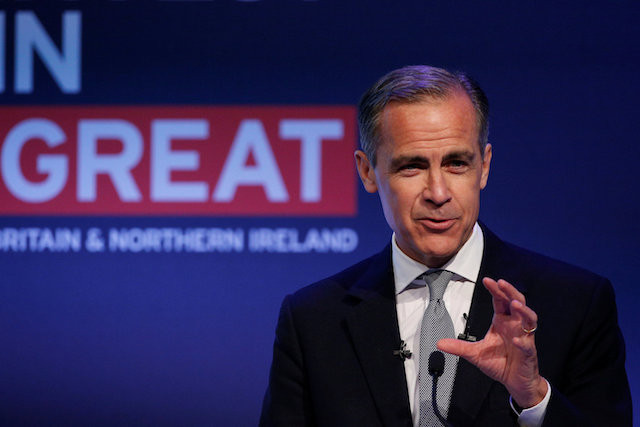The fast-emerging fintech sector is shaking up financial services and forcing banks to make their operations leaner and cheaper, and to offer more innovative and user-friendly products so as not to fall behind.
Fintech already employs more than 60,000 people in Britain, providing services like contactless payments, banking apps and online crowd funding, a sector worth nearly 7 billion pounds.
The government sees the sector boosting growth and offering job opportunities, but uncertainty over Brexit is prompting some firms to rethink whether Britain is the best place for them.
Centres including Berlin and Luxembourg have been targeting UK fintech firms since last June’s Brexit vote, and London-based fintech firm Transferwise told Reuters it would shift its European head office to the continent.
Carney’s reassurances on regulation underscore a supportive attitude from the government, which is seeking to avoid stifling innovation and sending firms to lighter-touch countries.
Mark Carney, governor of the Bank of England, speaks during a question and answer session at a Reuters Newsmakers event in London on 7 April 2017. Photo: Reuters/Peter Nicholls
Speaking at a government-sponsored conference in London to promote investment in fintech, Carney said the fastest changes were taking place with payment providers, and with companies that aggregated consumer data to provide price comparison and switching services.
“In their current form, these innovations are simply a new front end to the banking system where fintech providers take a slice of customer revenue and loyalty but none of the associated risks,” Carney said.
“They have generally avoided undertaking traditional banking activities. So for now, absent a substantive change in business models or scale of activities, the Financial Policy Committee is unlikely to want to bring these firms into the regulatory perimeter.”
NO RESTING ON LAURELS
Britain’s Financial Conduct Authority said this week it saw no need for new rules for blockchain, the emerging technology underpinning bitcoin that is seen as having the potential to help make processes such as the settlement of securities transactions cheaper and quicker.
The FCA is hosting a summit on Wednesday to discuss what more regulators could do to help the fintech sector flourish.
Brexit provides a chance for Britain to forge a new role for itself in the global economy, finance minister Philip Hammond told the London conference, though it was important that Britain does not “rest on (its) laurels”.
Mark Carney, governor of the Bank of England, and Philip Hammond, Britain’s chancellor of the exchequer, react as they attend the International Fintech Conference in London on 12 April 2017. Photo: Reuters/Neil Hall
“If the UK is going to make the most of the freedoms it will have after leaving the European Union we have to build trade links with the fast-growing economies of Asia... and our economy must remain at the cutting edge, not just of fintech,” Hammond said.
Berlin has already sent representatives to London to try to persuade UK fintech firms to relocate, saying they would be then guaranteed access to the EU market after Brexit in 2019.
Transferwise will move its European office to the continent by March 2019 to maintain customer links, its chief executive Taavet Hinrikus said.
“Uncertainty means that maybe if you’re building the next fintech business you shouldn’t build it in London today, until everything clears up again and we understand what’s going to happen,” Hinrikus said on the sidelines of the conference.
Gwyneth Nurse, a senior official in Britain’s finance ministry, said she was confident that a free trade agreement with the EU would be negotiated in the timescale set out by Prime Minister Theresa May, including a period for firms to adjust.
(Additional reporting by David Milliken, editing by John Stonestreet)


